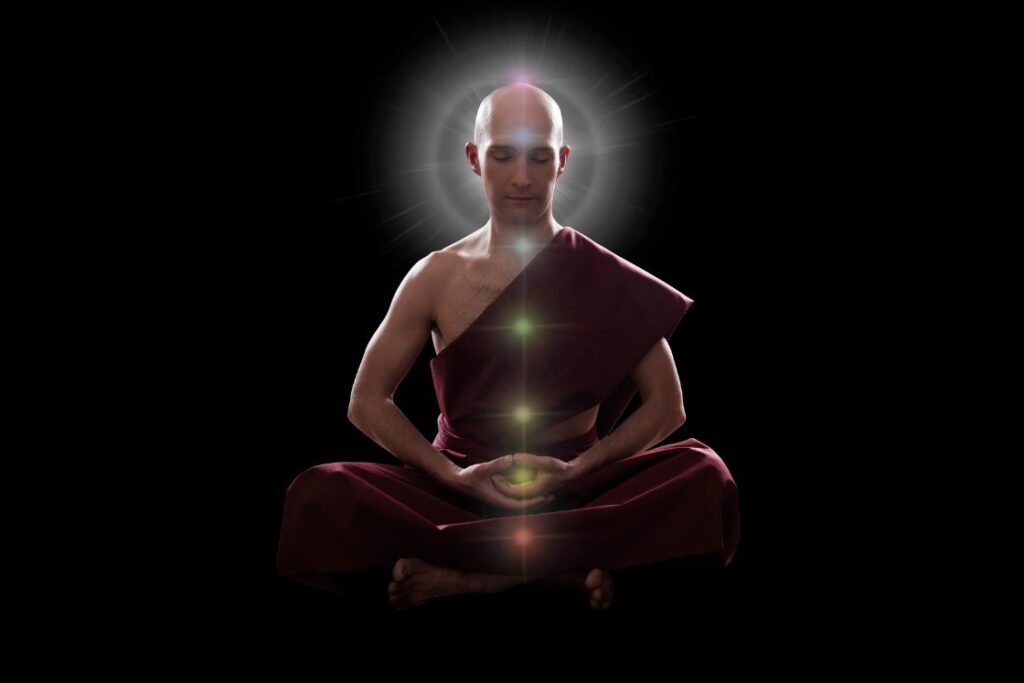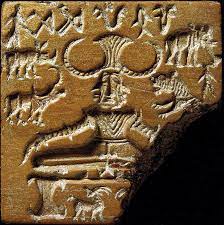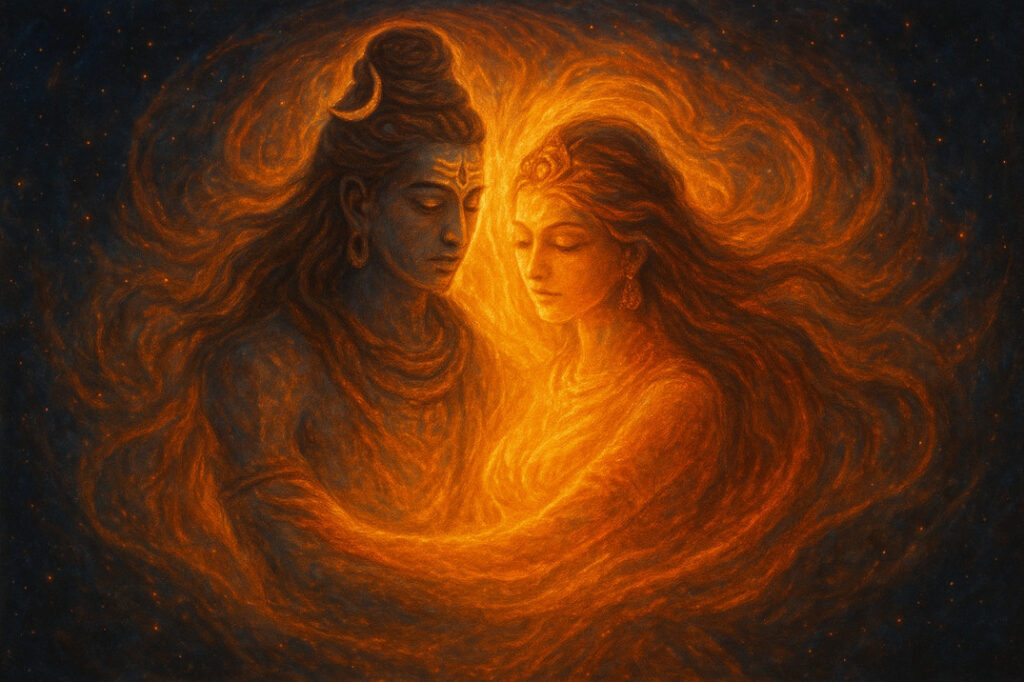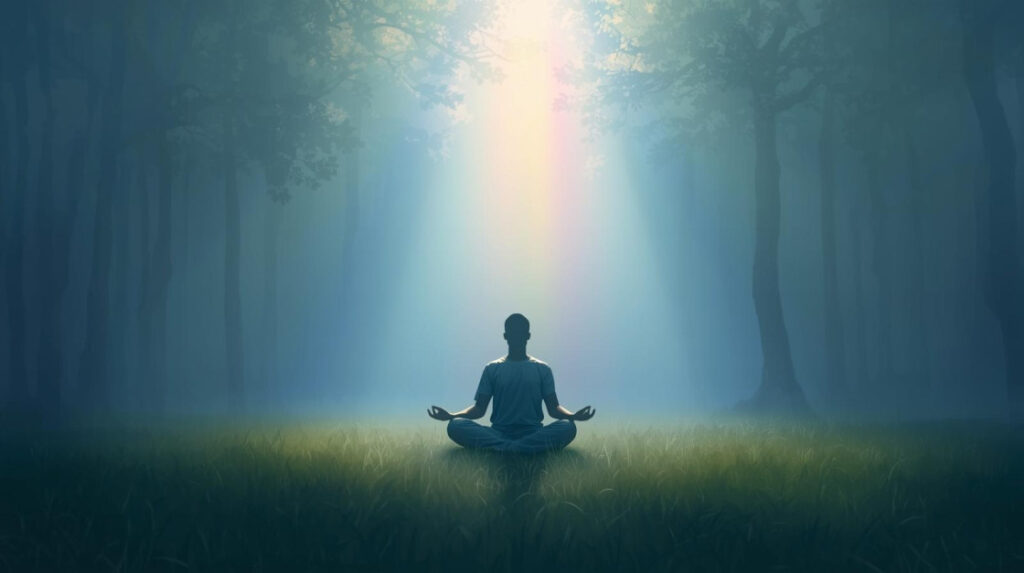
Tantra Yoga is without doubt one of the most historic techniques of religious development, but additionally probably the most misunderstood. Many individuals right now affiliate Tantra with rituals or sensual practices, however in reality, it’s a sacred path that helps you join your physique, thoughts, and spirit as one.
In Sanskrit, the phrase Tantra means “to increase” and “to liberate.” It factors to a lifestyle that widens consciousness and frees us from ignorance and limitation. Tantra Yoga brings this knowledge into apply by means of the physique, breath, sound, and energy- awakening the hidden energy that lies inside.
Whereas many religious paths encourage withdrawal from the world, Tantra Yoga teaches that life itself is the apply. Each experience- pleasure, ache, motion, or silence- turns into a doorway to self-realisation. It’s a yoga that welcomes the whole lot and guides you to see the divine in each second.
This text explores the true that means of Tantra, its historic roots, core philosophy, and sensible strategies. Additionally, you will uncover how Tantra Yoga transforms the physique and thoughts, serving to you reside with consciousness, freedom, and stability.
What’s tantra? the true that means past misconceptions

When folks hear the phrase Tantra, they typically consider thriller or secrecy. Over time, its actual that means has been coated by trendy misinterpretations. In reality, Tantra shouldn’t be about indulgence or desire- it’s a huge and historic philosophy that teaches the way to perceive life deeply and realise the divine by means of each expertise.
The phrase Tantra comes from two Sanskrit roots:
- Tan, that means “to increase”
- Tra, that means “to free or liberate”
Collectively, they describe a path of enlargement and liberation – a method of widening consciousness and seeing that the whole lot within the universe is related by one consciousness.
Tantra doesn’t ask you to reject your physique or feelings. As an alternative, it helps you perceive and use them as instruments for awakening. Each expertise, nice or painful, turns into a part of your development. That is what makes Tantra distinctive: it turns every day life right into a path of consciousness.
At its coronary heart, Tantra is about connection. It weaves collectively the knowledge of the physique, breath, thoughts, and vitality right into a single residing system. By means of this concord, you be taught to reside in stability, seeing the sacred in each motion and the divine presence in all types of life.
Additionally Learn: Idea of Creation in Tantra
The historic roots of tantra

The story of Tantra reaches again hundreds of years, even earlier than the Vedic interval. Although many authentic texts have been misplaced, the earliest proof of Tantric concepts seems within the Indus Valley Civilization round 3000 BCE.
Archaeologists found a small clay seal in Mohenjo-Daro exhibiting a determine seated in a yogic posture surrounded by animals. This determine, generally known as Pashupati, a type of Lord Shiva that means “Lord of the Animals,” is seated with crossed legs and heels urgent the perineum- a posture utilized in Tantra to awaken Kundalini, the vitality on the base of the backbone.
This discovery reveals that yogic and Tantric practices existed hundreds of years in the past. It additionally highlights Shaivism, the worship of Shiva as pure consciousness, and Shaktism, the worship of the Divine Mom, Shakti, because the inventive vitality of the universe. Collectively, Shiva and Shakti kind the muse of Tantric thought.
As centuries handed, the tradition of northern Vedic folks merged with southern Dravidian spirituality, making a wealthy and various Tantric custom. The sacred texts from this period have been known as Agamas, that means “what has come right down to us.” These texts described strategies of meditation, vitality awakening, and religious self-discipline that formed the Tantra we all know right now.
From these historic roots, Tantra unfold throughout India and later influenced many yogic paths, together with Hatha Yoga and Kundalini Yoga. It continues to reside as a science of consciousness – sensible, experiential, and deeply transformative.
Be part of Our 40-Day Stay Tantra-Based mostly Kundalini Yoga Course
The Philosophy of tantra: consciousness and vitality

On the coronary heart of Tantra lies a easy however deep reality the whole lot within the universe is made of 1 residing vitality. From the celebs within the sky to the ideas in our thoughts, all come up from the identical supply. Tantra teaches that by realising this connection, we transfer nearer to liberation.
Tantra describes life because the play of two divine forces Shiva and Shakti. Shiva represents stillness and pure consciousness. Shakti represents movement, creation, and energy. They’re inseparable, just like the flame and its warmth. When these two forces unite inside us, consciousness expands and concord is restored.
To clarify how consciousness unfolds, Tantra speaks of 36 tattvas– ideas of existence. These vary from the 5 bodily components (earth, water, hearth, air, house) to the subtlest ranges of thought and spirit. The journey of Tantra is to recognise these layers inside ourselves and rise from the outer to the interior, from kind to pure consciousness.
Tantra provides instruments to expertise this immediately:
- Mantra — sacred sound that awakens vitality and stills the thoughts.
- Yantra — sacred geometry that helps focus consciousness.
- Mandala — symbolic diagrams that mirror cosmic unity.
By means of these practices, Tantra turns into a residing expertise, not a principle. It helps us see that consciousness and vitality are one- and that this similar divine rhythm strikes by means of us all.
Additionally Learn: Tantra: The Historic Indian Path of Liberation and Consciousness
Tantra and the classical indian philosophies
To grasp Tantra extra deeply, it helps to see the place it matches amongst India’s historic philosophies. The six classical faculties, generally known as the Shad-Darshanas, are Sankhya, Yoga, Nyaya, Vaisheshika, Mimamsa, and Vedanta. All settle for the Vedas as their religious authority.

Alongside them have been non-Vedic techniques like Buddhism, Jainism, and Charvaka, which questioned or rejected the authority of the Vedas. These are generally known as Nastika philosophies.
Tantra stands aside from each teams. It neither relies on nor rejects the Vedas. As an alternative, it follows a path of direct experience- reality verified by means of apply reasonably than perception. For Tantric seekers, each expertise is a instructor and each a part of life is sacred.
Whereas different traditions typically educate withdrawal or renunciation, Tantra embraces life totally. It sees the world not as an phantasm however as a divine expression. Liberation, subsequently, shouldn’t be about escaping life however about seeing the sacred inside it.
This distinctive view formed later yogic techniques. Classical Yoga typically seeks to manage the physique to achieve the thoughts, whereas Tantra makes use of the physique as a bridge to the spirit. It honours the identical vitality that strikes the universe because the vitality that lives inside us.
What’s tantra yoga?
Tantra Yoga brings the philosophy of Tantra into every day apply. It transforms the concepts of consciousness and vitality into residing expertise by means of the physique, breath, and consciousness.
The phrase Yoga means “union.” Mixed with Tantra, it turns into the union achieved by means of enlargement and liberation. Tantra Yoga makes use of the physique and thoughts as devices of awakening. Each moment- consuming, respiratory, working, resting- turns into a part of religious development.
Core practices of tantra yoga
Tantra Yoga is a residing apply that connects the bodily, psychological, and religious layers of being. The principle practices embody:
- Asanas (Postures): Strengthen the physique and open vitality channels.
- Pranayama (Breath Management): Steadiness life drive and purify the thoughts.
- Mantra (Sacred Sound): Create vibration that aligns the thoughts with greater vitality.
- Mudras and Bandhas: Direct vitality by means of particular channels.
- Chakra Meditation: Cleanse and awaken interior vitality.
- Silence and Reflection: Convey consciousness to the stillness inside.
Collectively, these practices purify, stability, and awaken the physique and thoughts, guiding you towards interior freedom.
Forms of tantra yoga
Tantra Yoga consists of a number of paths, every guiding the practitioner in a novel method. The three principal sorts are Kaula, Mishra, and Samaya Tantra.
1. Kaula Tantra
Kaula means “household” or “group.” It teaches that each one facets of life — the physique, relationships, and every day activities- are a part of the divine. Kaula Tantra transforms peculiar experiences into religious realisation.
It consists of:
- Vama Marga (left-hand path): superior and unconventional rituals to interrupt psychological boundaries.
- Dakshina Marga (right-hand path): centered on purity, devotion, and self-discipline.
2. Mishra Tantra
Mishra means “combined.” This path blends exterior rituals with inner meditation, balancing the bodily and the religious. It provides a center method — sensible, balanced, and appropriate for many seekers.
3. Samaya Tantra
Samaya means “to be one together with her.” That is the very best and purest path, centered totally on interior expertise and devotion to the Divine Mom (Shakti). Right here, worship occurs by means of meditation, consciousness, and love, resulting in unity with common consciousness.
How tantra yoga transforms you
Tantra Yoga is greater than a set of practices- it’s a journey that adjustments how you reside, assume, and really feel. With regular apply, it brings stability to the physique, peace to the thoughts, and lightness to the center. These transformations contact each a part of life, serving to you reside with calm consciousness and confidence.
Advantages of tantra yoga embody:
- Interior Energy and Fearlessness: Tantra Yoga teaches you to face life as it’s, with out worry or avoidance. As you acquire management over your physique and thoughts, you start to really feel sturdy, regular, and unshaken by challenges.
- Acceptance of Fact and Actuality: This apply helps you see issues clearly and settle for them with knowledge. You cease working from difficulties and begin seeing them as classes that allow you to develop.
- Emotional Steadiness and Compassion: By observing ideas and feelings with out reacting, you be taught to remain centred. This consciousness softens the center, permitting compassion and understanding to develop naturally.
- Readability of Thoughts and Focus: The mixture of breathwork, mantra, and meditation clears psychological litter. Your ideas change into sharper, focus improves, and decision-making feels easy.
- Higher Bodily Well being and Vitality: Asanas and pranayama strengthen the physique, enhance flexibility, and increase circulation. Common apply will increase stamina and fills you with regular, pure vitality all through the day.
- Deeper Religious Consciousness: Tantra awakens the interior vitality that connects you to one thing higher than your self. It helps you’re feeling the presence of the divine in peculiar moments of life.
- Pleasure, Peace, and Concord in Day by day Life: With balanced vitality and a relaxed thoughts, you start to reside with ease and gratitude. On a regular basis actions change into peaceable and significant, full of quiet pleasure.
Not like paths that goal to flee the world, Tantra Yoga brings liberation inside it- serving to you reside with consciousness and charm in each second.g.
The objective: liberation from maya
The last word goal of Tantra Yoga is freedom from Maya, the phantasm of separation. Maya makes us overlook our true nature as pure consciousness. Tantra lifts this veil by educating us to see the divine in all issues.
True liberation doesn’t imply escaping every day life however residing it with consciousness. If you see past opposites – good and dangerous, pleasure and sorrow — peace arises naturally. By means of common apply of meditation, mantra, and pranayama, the thoughts clears, the center softens, and consciousness expands into unity with all life.
Conclusion
Tantra Yoga is greater than philosophy it’s a way of life with consciousness. It teaches that divinity shouldn’t be distant however current in each breath, sound, and feeling.
In Tantra, Shiva is stillness and Shakti is motion. Collectively they kind the rhythm of life- the dance of consciousness and vitality that flows by means of all creation. Once we reside in consciousness of this dance, we see that we’re by no means separate from the universe.
To reside Tantra is to reside consciously to see magnificence, knowledge, and sacredness in all issues. When vitality and consciousness transfer collectively in stability, life itself turns into a meditation, full of peace, unity, and pleasure.